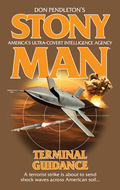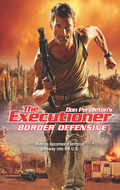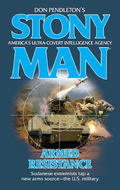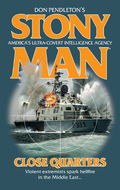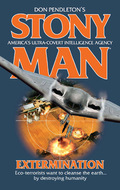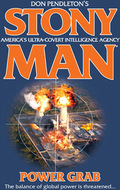Buch lesen: "Choke Point"
STONY MAN
The Stony Man team of special operators stands ready to go into ultra-covert action whenever the President needs a specific brand of below-the-radar expertise. If the crisis is real and immediate, cybernetics experts with state-of-the-art technology kick into gear from the war room of a secret facility known only to the Oval Office, while the commando soldiers of Able Team and Phoenix Force lead the ground assault. Consummate warriors dedicated to protecting the innocent, Stony Man draws a hard line against enemies of the free world.
PERMANENT SHUTDOWN
A U.S. senator’s murder and the kidnapping of several children of high-profile government officials leave the President no choice but to call in Stony Man to investigate. But the kidnappings are only the tip of the iceberg. The ransom money and income from a human trafficking ring are being used to fund terrorist activities overseas. It’s a race against time as Able Team has to track down the kidnappers in Florida before anything happens to the children, while Phoenix Force hunts the ringleader in Morocco. Their goal: neutralize the operation. No matter what.
James tapped his friend’s shoulder. “Um, Rafe?”
Encizo turned and saw the armed men through the front window of the car. “Uh-oh.”
Mazouzi was too busy yelling at his informant to realize they were in trouble. The keys were in the ignition so Encizo put the clutch to the floor, started the engine and got them in Reverse. He let out the clutch and took off with a squeal of tires, causing Mazouzi to curse.
“We have company,” James snapped as he pulled out his Beretta.
The armed men, four in all, fired semiautomatic handguns, but Encizo had put enough distance between the Peugeot and them. One shot hit the corner of the windshield, though, and spider-webbed across the passenger side, blocking James’ view.
As the Peugeot gained speed, James leaned out the window, leveling the pistol in his right hand on the nearest man, and squeezed off a double-tap, taking the intended target in the chest. But the jerky movement of the Peugeot pulled him back inside.
Encizo’s face was screwed up in concentration as he maneuvered along the narrow street. At one point, he sideswiped a parked vehicle, leaving behind a large gouge with the echo of scraping fiberglass and metal.
“What are you doing?” Mazouzi demanded.
“Saving your ass,” James replied. “I think.”
Choke Point
Don Pendleton

Special thanks and acknowledgment to
Matt Kozar for his contribution to this work.
Contents
CHAPTER ONE
CHAPTER TWO
CHAPTER THREE
CHAPTER FOUR
CHAPTER FIVE
CHAPTER SIX
CHAPTER SEVEN
CHAPTER EIGHT
CHAPTER NINE
CHAPTER TEN
CHAPTER ELEVEN
CHAPTER TWELVE
CHAPTER THIRTEEN
CHAPTER FOURTEEN
CHAPTER FIFTEEN
CHAPTER SIXTEEN
CHAPTER SEVENTEEN
CHAPTER EIGHTEEN
CHAPTER NINETEEN
CHAPTER TWENTY
CHAPTER TWENTY-ONE
CHAPTER TWENTY-TWO
CHAPTER TWENTY-THREE
CHAPTER TWENTY-FOUR
CHAPTER TWENTY-FIVE
CHAPTER TWENTY-SIX
CHAPTER TWENTY-SEVEN
CHAPTER ONE
Maryland
Senator Charlie Maser slowed as he approached the secondary road leading off the scenic byway that ran through Chesapeake country.
The dash clock on his luxury SUV read 2:52 a.m. and with only a sliver of a moon, Maser had almost missed the turn. He couldn’t be late...not at this time and this place. He thought of the metal suitcase on the seat behind him—a suitcase that met the specifications he’d been given, down to the last detail—its contents worth a king’s ransom.
Or at least the prize for a princess.
Charlie Maser’s princess was a thirteen-year-old girl, a girl who may have been through things so horrible Maser couldn’t even bring himself to imagine them. They were things the caller had told him might happen if Maser didn’t cooperate, but he’d also been assured that so far they hadn’t happened. Maser wasn’t sure if he could believe his ears when he learned that his only daughter had fallen into the hands of a vile, disgusting lot of kidnappers who had been on a rampage for the past two months.
Only wild and vague rumors had reached his ears about this group—a conversation he’d overheard here, a secure email brief there—but Maser hadn’t actually believed most of it. Well, he did now and he still couldn’t come to terms with the fact that what had happened to Natalie—as what had happened to the young children, boys and girls, of a number of other politicians—probably could have been avoided if he’d been more diligent in finding the truth. There were lots of people he could’ve reached out to and gotten the full story: other senators, members of the house and even connections inside the FBI and CIA, as apparently there were transnational matters attached to these men.
None of it mattered now, though. All that mattered was getting his beautiful girl back into his arms safe and sound. He’d never let her go again.
Maser had received the ransom call just after a particularly grueling session on the senate floor, one item after another coming across the wire for him to vote yea or nay, more fat pieces of legislation that spent a lot of money and did next to nothing. Maser had considered not running for a second term just eighteen short months ago, but had changed his mind at the urging of his constituents, and the election coffers filled up in no time at all. Mostly they were donations from friends who owned multibillion-dollar companies, or the untapped wealth of special-interest groups from which he had to draw.
But per the kidnappers, the money riding in that metal case had to be his own and untraceable.
In retrospect, Maser didn’t give a damn. If he had to cough up twenty million dollars instead of five hundred thousand he would’ve raided every fund he had and then knocked off a bank for the balance. Not this time, though, and Maser was smart enough to know the kidnappers hadn’t asked for a large ransom because they didn’t want him to draw any attention.
Maser’s wife had thrown a screaming fit when he refused to let her go, trying to explain to her that following the instructions of the men who had their little girl was paramount to getting her back in one piece. That’s the advice a friend at the Federal Law Enforcement Training Center—FLETC—had given him after Maser told him he was seeing some possible new legislation and needed the perspective of someone with practical law-enforcement experience. Maser didn’t think he’d raised any suspicions with his questions, and politely thanked the guy before hanging up and going straight to the bank.
Their personal financial officer had thought maybe Maser had gone stark-raving mad, wanting to withdraw that sum of money, but Maser had cited a campaign emergency for which he would spend his own money and then expense it back to the campaign later. Luckily, that had seemed to dispel any other questions and quashed further curiosity. The fact he was running in an election at the present had actually proved a saving grace.
Now he had his money and he’d followed the instructions to the letter, making the drive from Washington, D.C., along the northerly route that took him around the bay and back down to Maryland via Interstate 95 to State Road 213 in Maryland, eventually winding up in Chesapeake country. Maser wondered why the scenic route instead of cutting across the Chesapeake Bay Bridge but he hadn’t asked. Again, the advice he’d received was to follow instructions to the letter and don’t argue with or agitate the kidnappers.
The golden rule: the caller was in charge.
Maser slowed and as he turned on the side road he noticed a fog had started to materialize. He slowed some more, looking at the clock again and sighing to ease the tension. At this rate he’d be right on time by proceeding two and a quarter miles to a green camping sign that marked an access road. Off the road from there and another mile until he reached an old, gray pickup truck. The clock turned to 2:59 a.m. when the pickup truck came into view just ahead through the increasing layer of fog.
Shit, it was like being on an English moor or something.
Maser wondered how much he’d been directed here for the purpose of isolation and how much for dramatic effect. Whatever the reasons, the kidnappers were sending a message that they knew what they were doing. The caller had been explicit as to the consequences if Maser deviated from the prescribed schedule or disobeyed in any manner. Maser had listened carefully, writing down every detail and the times he’d done things, keeping practically an hour-by-hour journal of his every move. He wanted to make sure that if this didn’t pan out and he lost his own life, the cops would at least be able to follow his trail.
Maser rolled up on the truck, stopped and flashed his high beams once before killing the engine.
He’d rolled his window down a space to make sure he could hear any verbal instructions he might receive—not that he’d been specifically told to do so but it made good sense. A minute ticked by, two minutes—then five minutes turned into ten minutes. Finally, Maser began to wonder if he’d made some sort of mistake and he could feel the pang of a panic attack in his chest. His breathing started to shorten and he willed his shaking hands to steady.
Had he fucked it up? Had he made a mistake, missed some direction and forfeited the life of his sweet and beloved Natalie?
The shadow falling across the passenger-side window caused him to jump, and he turned to see the outline of a human figure there. Then his driver’s-side door opened and he was yanked out of the car and thrown to the ground. The air burst from him on impact, his lungs burning with the sudden exertion. He realized now why he’d been instructed not to wear a seat belt for the entire journey. Maser could remember how he thought that had been kind of dumb because he might’ve been pulled over, but then he knew that by starting off at night it would’ve been next to impossible for a police officer to see he wasn’t restrained.
Besides, what cop in his right mind would ticket a U.S. senator?
Maser felt the hard, unyielding form of something metal pressed to his head, something that could only have been the muzzle of a gun, and a foot planted on the small of his back.
“Arms out to your side,” a muted voice ordered. It sounded like a mask covered the speaker’s mouth. “Where’s the money?”
“Backseat, like instructed,” Maser replied. He probably hadn’t really had to add that last part, but he didn’t figure pointing out that he’d followed instructions could hurt him any at this point.
He heard the rear door of the SUV open, then some rustling and finally the unmistakable clicks of the latches being disengaged. For a long time he didn’t hear anything, but his captor eventually spoke again.
“You think you’re smart?” the guy asked.
“What do you mean?”
“Answer the fucking question, asshole!” another voice said, this one also muffled by something.
“I—I guess so,” Maser said.
“You guess so?” the first speaker replied in a mocking tone.
Or was it mocking? Hard to tell, with the man’s voice being obscured by whatever the man wore over his mouth.
“We got us an indecisive politician,” the second voice remarked, and this time Maser could detect just a hint of an accent—something maybe Scottish or British. “That’s sad. That’s very, very sad. A scathing indictment of our leadership today in Washington.”
Scathing indictment of leadership in Washington? What the hell kind of kidnappers were these? The first one sounded like a miscreant but the other had a touch of class, as if he’d been educated abroad. That would probably fit with the accent. Maser continued to mark each one of these facts in his memory, bound to write down the details if he walked away from this alive. Being he was lying here in the middle of nowhere on his belly, helpless and unarmed, with no one in law enforcement having any knowledge of where he was or what he was doing, Maser entertained a notion for the first time that he might not walk away from this situation alive.
The thought prompted him to boldness. “Why don’t we cut the bullshit? You guys have your money so give me my daughter. We’ll walk away and nothing more will be said.”
“Shut up!” the first kidnapper sneered. “Just shut up. We give the orders around here, not you.”
Maser thought about pressing the point but decided it wouldn’t do a bit of good. These two weren’t to be reasoned with, and in all likelihood they were just lackeys anyway. Pickup men weren’t uncommon in well-organized kidnapping rings, another fact Maser’s friend at FLETC had turned him on to, which probably meant there were limits and boundaries. So far, things weren’t going well but they weren’t exactly going bad.
Best to just play along with the game.
The European-sounding one knelt by him and Maser thought he detected the odor of cigarettes. “My partner asked if you were smart because you’ve done some really stupid things.”
“Like what?” Maser asked.
“Like coming out here by yourself,” the man replied easily. “Like being a good little boy and doing exactly what you were told. You see, the main problem you have is that now we got the money, we have no real incentive to keep you alive.”
Now it was going to go badly and Charlie Maser knew he couldn’t do a damn thing about it.
“What’s more,” the man continued, “you didn’t get proof of life. We know you called some people, that you got advice. Too bad you listened to your friend in the FLETC because the truth is you got bad advice. You should’ve gotten proof of life before you agreed to pay a ransom.”
“Let my little girl go, you bastards!” Maser pleaded, his voice cracking as he whimpered, “I don’t give a damn what you do to me, but please let my girl go.”
“Shh, don’t cry,” the man said and then he burst into a fit of laughter. He rose and said, “We’re not going to kill pretty little Natalie. She’s much, much too valuable alive and well. But we can’t really have you running around blabbing this business to anybody.”
“Wh-what are you saying?”
“I’m saying you’ve outlived your usefulness, Senator. It’s time for you to step down.”
“Yeah,” the slimy one interjected. “Time to go visit that big capitol building in the sky.”
“You can kill me if you want,” Maser said, “but it won’t do you any good because someone will be looking for me. And when they find me, they’re going to figure out who did it, and then your days of kidnapping will be over.”
“I highly doubt it,” the one with the accent replied.
And those were the last words Senator Charlie Maser ever heard.
CHAPTER TWO
Stony Man Farm, Virginia
“The murder of a federal official, even a U.S. senator, is typically assigned to a task force within the Justice Department,” the President of the United States told Harold Brognola. “Not this time.”
“I understand, Mr. President.”
“I’ve instructed the deputy director of the FBI to transit information directly to your office by secure channels. Use that information to find out who’s behind the murder of Senator Maser and why.”
“And once we know?”
“Do whatever has to be done,” the President replied in a tone as cold as Brognola had ever heard him use.
“I understand, sir.”
“Good luck, Hal.”
“Thank you, Mr. President.” The line went dead before Brognola could even wish the President a good evening, which he obviously wasn’t going to have no matter what Brognola said.
The Stony Man chief hung up and sighed, barely able to quell the burning in his throat. The twinge from the esophageal spasms, a chronic condition he’d suffered for more years than he could remember, reminded him of the roll of antacids in his desk drawer. He popped three and then made a note in the digital recorder he’d received from his wife for Christmas to buy more.
That task complete, Brognola proceeded from his office to the electric tram in the basement. A hundred yards later, he stepped from the small transporter into the Operations Center of the Annex, a subterranean facility that housed the most modern electronic and human resources ever assembled for one purpose: combating America’s enemies. There were hundreds...nay, thousands of those who wished to do harm to the United States. Every single day of his life since agreeing to serve as top dog for the special-operations group code-named Stony Man, Brognola had worked tirelessly to protect the liberty and peace of his nation.
Stony Man did one thing and it did it very well, better than probably any other agency of its kind. But Brognola wasn’t so deluded to believe it was his consummate leadership skills that had held it together. Not even close. Stony Man worked for three reasons: brilliant and dedicated support staff, the finest and bravest collection of fighting men ever assembled and the ideals born from the devotion and loyalty of the man named Mack Bolan.
It was Bolan’s War Everlasting against the scourge of organized crime, and subsequently the forces of terrorism, that spurred the founding of Stony Man. It was Brognola’s relationship with Bolan—one that had started as a federal cop in pursuit of the fugitive nut-job calling himself the Executioner—that had led to his appointment as head of Stony Man. Today, Brognola was privileged to call Mack Bolan a lifelong friend. If Brognola had his way, he would have tracked Bolan down at that moment and sought his advice.
Brognola didn’t know exactly what the President’s intelligence people were sending, but he did have some inkling of where it was going. Maybe it was something that had to be handled by one of the teams, although he couldn’t imagine how the murder of one senator could spark a concern for international security. Still, Stony Man served at the pleasure of the Oval Office and whoever happened to occupy it, and Brognola could count on one hand the number of times the subject had been broached about whether it was necessary for their operations to continue. Every time, nixing the program had ultimately been shot down as a way to turn a very good idea into a potentially bad one. To Brognola’s knowledge, every President who’d entertained the idea had never come to regret the decision to keep Stony Man going: it was the final option.
“Is that coffee fresh?” Brognola asked Barbara Price as he entered the conference room.
“It is,” she said. “Would you like a cup?”
“Depends on who made it,” he replied. “I’m not sure I could handle any of Kurtzman’s rotgut right at the moment.”
Price raised one of her beautiful eyebrows. “You’re in luck, then. I made it.”
Brognola nodded in gratitude and then helped himself to a large cup. “You alerted Able Team?”
“I did,” Price said as she returned her attention to the built-in monitor in front of her, one of the many recessed into the massive conference-room table capable of seating a small army. In this case it was actually not an exaggeration. “I told them we’d be in touch as soon as we had some intelligence. And before you ask, Phoenix Force has been upgraded to standby.”
Brognola mumbled a thanks as he sat with his cup. He rubbed at his eyes and said, “The President’s intelligence reports from Justice should be coming through at any time. I don’t know the details yet, but obviously there’s much more to this than a dead politician.”
“Well, I thought I’d get a head start and had Bear pull Senator Maser’s dossier.”
“Items of interest, anything perhaps out of the ordinary?”
Price stared intently as she paged down the electronic file assembled by Stony Man’s resident computer expert and cyber-team leader, Aaron Kurtzman. “Unremarkable, to be honest. Maser was born and raised in New Hampshire. Entered his first term in office after working his way from a junior position in sales and marketing, and ending as CEO of the Biddler and Holmes Corporation.”
“What does that firm do?”
“What they did,” Price replied. “Past tense. They went under about three years after Maser left.”
“Maybe that’s our angle,” Brognola said. “It’s possible he left them high and dry, and when the company went belly-up somebody went looking for payback.”
Price shook her head. “That’s what I thought at first but it doesn’t fly. Maser left the company in the black, and actually it was extremely profitable. They went out of business due to poor investments and inadequate leadership, according to the financial statements and reports from independent audits conducted after Biddler and Holmes filed for bankruptcy.”
She handed one of the data sheets on that particular event to Brognola so he could see for himself. “Okay, so he’d been gone and running for public office long after that so it’s not likely anybody would have connected him to the company’s demise.”
Price nodded and then sat back in her chair and stretched. She continued, “His wife apparently comes from a wealthy family, and they’re the ones who originally backed his bid for a senate seat.”
“So you figure whatever happened here has something to do with the time frame after he entered public office.”
“I think it’s our best working theory, Hal.”
“What about that? Has there been anything extraordinary about his political career?”
“I’d say about average,” she said. “He hasn’t been particularly supportive of any key legislative issues, at least none that would be hot topics of debate, so it’s likely he didn’t draw the attention of any crazies. I—”
A loud ping echoed through the conference room and Price turned her attention to her display terminal. She mumbled something Brognola didn’t make out and then began tapping at the keys with the dexterity of an experienced typist, her unfashionably short fingernails producing clacking noises. When she’d finished typing, the display at the end of the conference room lit up to show a report stamped with “confidential” and bearing the seal of the U.S. Department of Homeland Security.
“It’s the reports from Justice that the President promised.”
Brognola squinted at the initial breakdown of the information contained within the file and then referred to a closer copy available on the terminal screen he raised out of the table. He perused the table of contents before finally pointing to one particular item: Associative Criminal Activities, Nonredacted.
“There,” Brognola said. “Pull up item fourteen, please.”
Price did and Brognola began to read in earnest. With every report of this kind, particularly if it contained sensitive or classified material, two official versions were typically circulated. To those outside the intelligence communities, there were redacted, abridged or even omitted pieces of data categorized by the Justice Department and National Security Agency with the remainder being labeled sensitive but classified, or just controlled unclassified information, which was typically reserved for official use only.
The material remaining was then considered either classified, secret or top secret and it was into one of these three categories that the kind of material Brognola now read typically fell. As the Stony Man chief absorbed the information he began to understand why such damning information wouldn’t be for dissemination to the public, or even to most individuals who didn’t possess a security clearance for it.
“Holy mother of—” Brognola began.
“My sentiments exactly,” Price interjected.
“Get Lyons on the phone. Immediately.”
* * *
WHEN CARL “Ironman” Lyons got the page from Stony Man to be on the alert, he was in the middle of climbing the Grand Tetons.
A particularly long and grueling mission that had taken him and his two compatriots into the heart of Iran, ending in a scrap from which Phoenix Force had come running to bail them out, had left the Able Team leader tired and ready for some vacation. The past three weeks had been a good rest—they’d gone to Florida for the first week, the second week Lyons had gone to northern Minnesota by himself on a fishing trip, and this week he’d reunited with his teammates, Hermann Schwarz and Rosario Blancanales, for a sprightly few days of fun and camping in the Rocky Mountains.
While Grand Teton National Park provided an excellent environment for these activities, Lyons had always been much more of an outdoorsman than his two companions, so they had opted not to join him for this climb. Instead, they stayed at the campsite to drink beers and talk of whatever exploits regarding the female species came to mind, half of them probably fiction.
Lyons had just pulled himself up and over a huge rock, swinging his muscled legs into an anchoring position and getting his angle before negotiating it with the rest of his body. Lyons stopped to mop sweat from his brow with a bandanna he’d secured around his neck and tucked into the neoprene shirt he wore. He surveyed the shimmering horizon, realizing it was just about time to think about going back. He’d promised his friends he’d return before dark and if he didn’t make good on it, chances were they would get concerned and come looking for him.
The vibration of his secured satellite data phone, the invention of Kurtzman’s electronics team, signaled for his attention. He snatched it from his belt and barked, “Go for Lyons.”
“Carl, it’s Barb. Are you with the others?”
“Not at present. What’s up?”
“We just received an intelligence report compiled from several multijurisdictional investigations conducted into the death of New Hampshire Senator Charlie Maser.”
“And?”
“We’re sending a chopper to get all three of you now,” Price replied. “I’m afraid R and R is canceled.”
“That doesn’t sound good.”
“It’s not,” Brognola’s voice boomed in Lyons’s ears. “We’ll be able to better brief you on the details once you get here.”
“We’re coming to the Farm?”
“Yes, although it’s entirely too lengthy and difficult to explain now,” Price said. “Just get here as soon as you can.”
“We’re on our way,” Lyons said and signed off with the standard catchphrase, “out here.”
Lyons returned the phone to his belt, took a deep breath and sighed. He’d hoped for another couple of days to recuperate but he could tell just from the tension in the voices of Price and Brognola that something had gone very wrong. Lyons couldn’t even recall having heard the name Charlie Maser before, not that he kept a running tally on every elected official in Wonderland. For sure, there were some who were much more visible than others and needed to get some attention from Stony Man Farm, in Lyons’s humble opinion. But it wasn’t really in his job description to make those kinds of determinations—he preferred to be pointed at the threat and let loose to deal with it.
The hit-and-git mentality defined the collective psyche of Able Team. They were America’s urban commandos, three berserkers trained to bring justice by fire to American streets and keep its citizens safe. This mode of operation was not only the one that Lyons preferred, but also the one in which he felt most comfortable. Lyons wondered if he’d ever live long enough to retire. What the hell would he do with his life when he didn’t have something desperate to pursue, some terrorist or crime lord to take down?
He’d only completed about a third of the distance to the camp before he heard the whip-whap of chopper blades, spotting the light from the setting sun reflecting in red-orange tints off the body of the helicopter before the whole shape came into view. The chopper dipped low and Lyons saw the familiar form of Blancanales as he reached out and gestured to some point nearby, probably a clearing beyond a copse of trees. Lyons waved his understanding and then broke into a jog so they wouldn’t have long to wait for him.
Within a few minutes he emerged from the line of evergreen trees to find the chopper waiting for him. It was the dead of summer but even the nighttime air was significantly cool. The rotor wash whipped at Lyons’s blond hair, which had started to become increasingly tinged with hints of gray over the years—probably a bit prematurely given the nature of his job—although not anywhere near the blanched white of Rosario Blancanales.
Blancanales, a husky man with muscular forearms and dark eyes, smiled at his friend and offered Lyons a hand. The Able Team leader nodded his thanks as he gripped his friend’s hand and hopped aboard a chopper belonging to the U.S. Forest Service. In a moment, the blades increased in pitch and the chopper lifted smoothly from the green-brown terrain of Jackson Hole Valley.
Seated on a bench with his back to the rear wall of the fuselage was the other Able Team member. Hermann Schwarz was not only the team’s resident electronics and computer expert, a talent that had earned him the “Gadgets” nickname, but he also possessed a wicked sense of humor. Schwarz was actually one of the most fearless men Lyons had ever met, not reticent to start cutting up even in the middle of a firefight. He was wiry but strong, not scrawny in the least, with wavy brown hair and a thick mustache.
“How was your stroll?” he asked Lyons over the thunderous noise of the chopper.
“I wasn’t strolling,” Lyons replied. “I was climbing.”
“You’re one of those mountaineering snobs, aren’t you?” Schwarz deadpanned.

